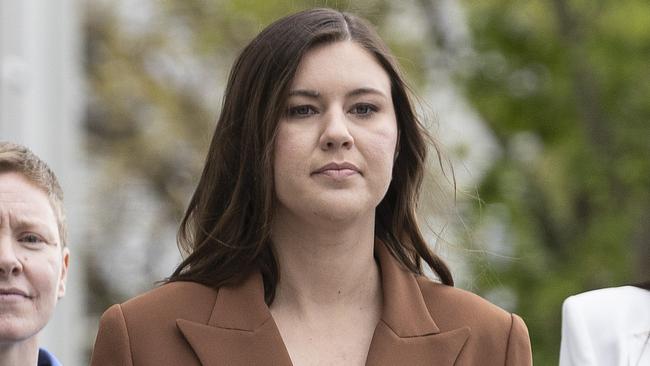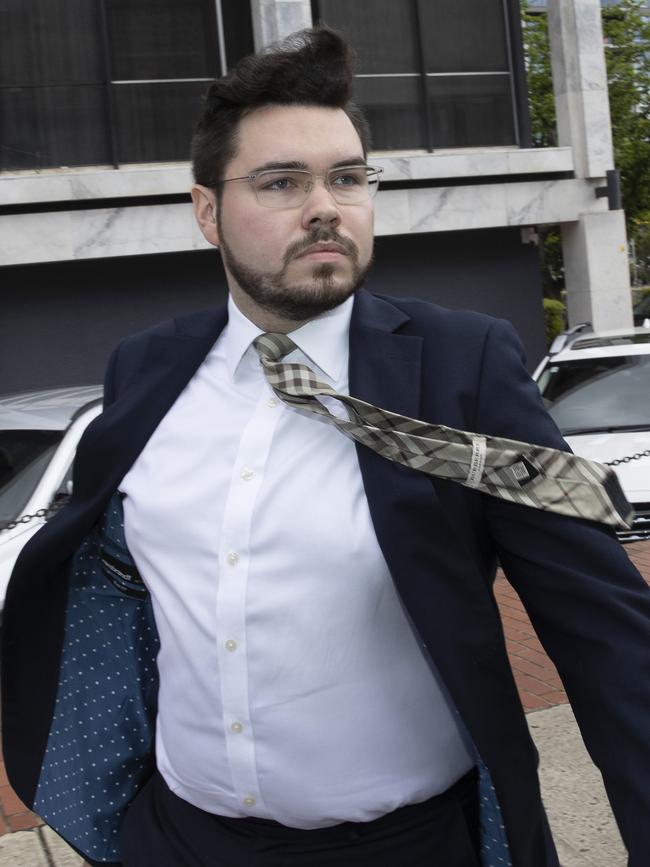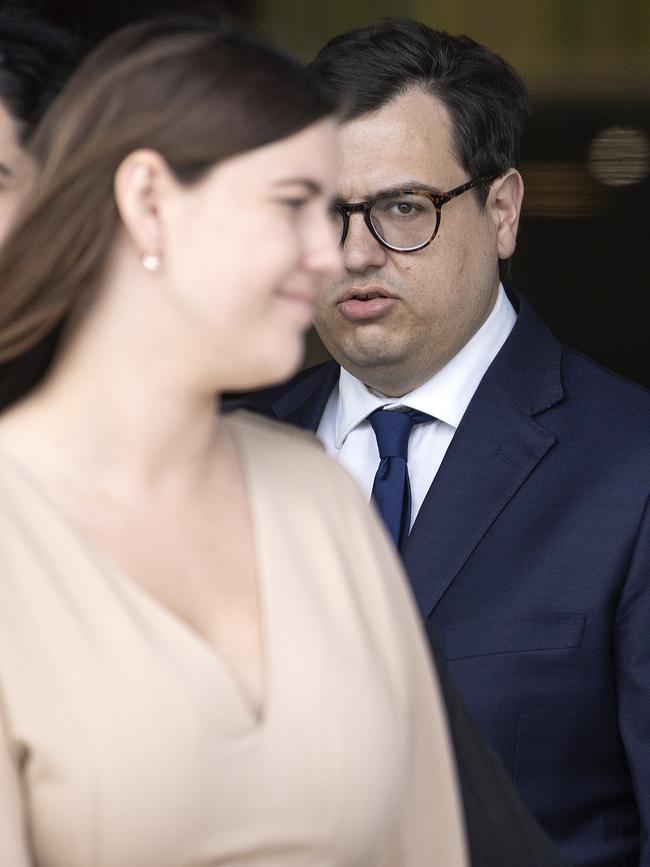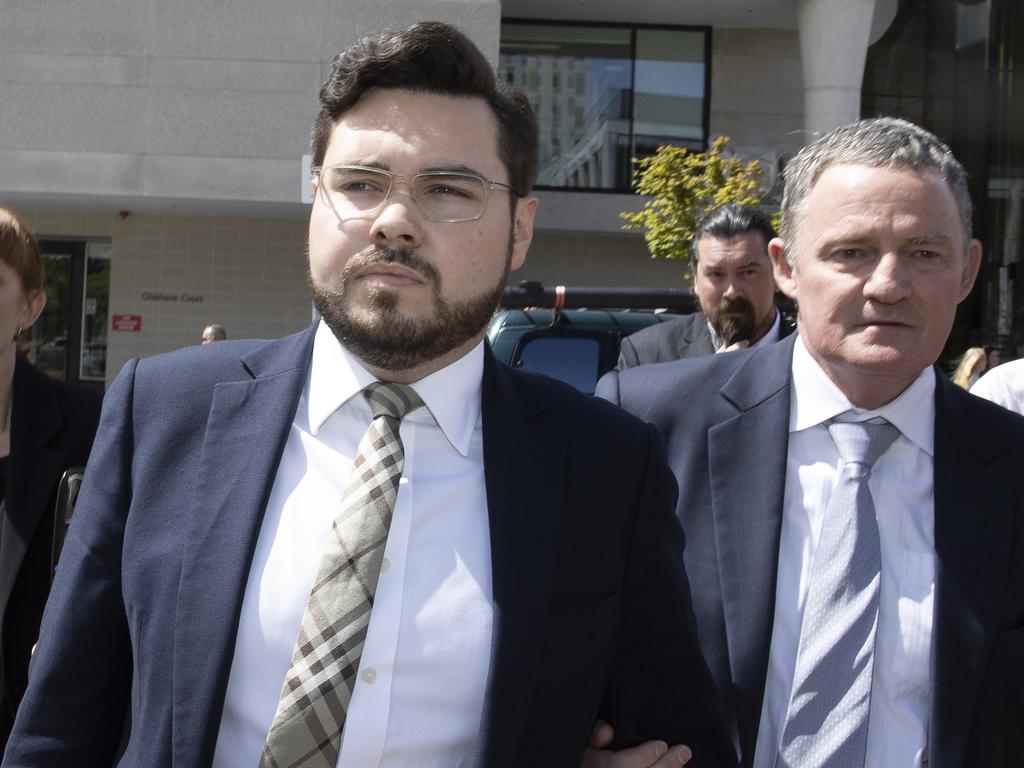Police doubted Brittany Higgins but case was ‘political’
The most senior police officer on the Brittany Higgins case believed there was insufficient evidence to prosecute Bruce Lehrmann but could not stop it.

The most senior police officer on the Brittany Higgins case believed there was insufficient evidence to prosecute Bruce Lehrmann but could not stop the ACT Director of Public Prosecutions from proceeding because “there is too much political interference”, according to diary notes made by the ACT Police Manager of Criminal Investigations, Detective Superintendent Scott Moller.
In a separate executive briefing last year, Superintendent Moller advised that investigators “have serious concerns in relation to the strength and reliability of [Ms Higgins’] evidence but also more importantly her mental health and how any future prosecution may affect her wellbeing”.
On Friday the ACT DPP, Shane Drumgold SC, withdrew the charges against Mr Lehrmann, citing concerns for Ms Higgins’ mental health, so his retrial – set down for February – will no longer proceed. The original trial was aborted in October due to juror misconduct.
The executive briefing lists a series of concerns by senior police, including that Ms Higgins had repeatedly refused to provide her original mobile phone; had deliberately deleted messages from a second phone; had lied about seeking medical attention after the incident; and had joked about wanting “a sex scandal” a month before the incident. Some became issues at the trial.


The briefing, dated June 9, 2021, states that “there is limited corroborative evidence of sexual intercourse taking place or consent being withdrawn or not provided”.
An attached minute signed by Detective Inspector Marcus Boorman, the investigation manager assigned to the case, states: “Investigators at this juncture have a number of concerns regarding inconsistencies in disclosures and other evidence obtained during the investigation. In light of the issues identified, serious concerns exist as to whether there is sufficient evidence to prove the alleged offence.”
The documents obtained by The Weekend Australian also reveal that Ms Higgins texted boyfriend David Sharaz in May last year saying: “F..k it, if they want to play hard ball I’ll cry on The Project again because of this sort of treatment.”
None of the texts or the police doubts about the case were revealed to the jury.
Superintendent Moller made notes of a conversation with his boss, ACT Deputy Chief Police Officer Michael Chew, on June 17 last year while discussing Operation Covina – the Higgins/Lehrmann sexual assault case.
At that point in the investigation, The Weekend Australian understands, more than half of the witness list had yet to be interviewed by police, but it appears the DPP, led by Mr Drumgold, had already decided to prosecute.
In the diary note, Superintendent Moller wrote: “Insufficient evidence to proceed.
“DCPO [Mr Chew] advised he had a meeting with DPP who stated they will recommend prosecution. DCPO stated ‘if it was my choice I wouldn’t proceed. But it’s not my choice. There is too much political interference’. I said: ‘That’s disappointing given I think there is insufficient evidence’.”
The following day Superintendent Moller forwarded a copy of the interim brief of evidence to Commander Andrew Smith to conduct an independent review of the investigation. The result of that review is not known.
Ms Higgins first spoke to police on April 1, 2019, a week after the events at Parliament House, but informed them two weeks later she did not wish to continue with the allegations. On February 5, 2021, she re-engaged with police, telling them she had been interviewed by the media and didn’t want to do an evidence-in-chief interview until her interview with The Project host Lisa Wilkinson had aired on television.
The following day “police advised Ms Higgins the intended media events … may jeopardise any subsequent criminal investigation; however Ms Higgins made it clear to police she was not willing to provide investigators with a formal statement in relation to the allegations until the media stories had been published. Ms Higgins stated that she wanted to ensure the sexual assault investigation was ‘active’ in anticipation of the media events.”
The TV program aired on February 15 and Ms Higgins sat down with police for her evidence-in-chief interview nine days later.
At that interview investigators reiterated to her the need to examine her mobile phone for potential evidence. “Ms Higgins refused to hand over her phone despite being explained the evidential value of the process,” the police report says.
The AFP statement of facts prepared by Superintendent Moller reflects police frustration over difficulties in obtaining Ms Higgins’ mobile phone after the interview to extract data.
On March 15, when police had arranged for a second time to meet Ms Higgins to obtain the phone, she failed to turn up or to respond to calls. “During the afternoon on the same date police observed Ms Higgins on commercial television at the March4Justice march at Parliament House,” Superintendent Moller wrote.
“She attended the location and gave a speech to the persons present.”
On May 5, 2021, Superintendent Moller was informed that ACT Victims of Crime Commissioner Heidi Yates had advised that any contact with Ms Higgins was now to go to her rather than directly to Ms Higgins.
Three weeks later, Superintendent Moller and other detectives met Ms Higgins, who was accompanied by Ms Yates, at the Winchester Police Centre in Canberra, where she gave a second interview.
“During this conversation I stressed to Ms Higgins the importance of refraining from participating in any media interviews in relation to this matter,” Superintendent Moller says in his police statement.
On this occasion Ms Higgins handed over a mobile phone.
Police recovered a text exchange between Ms Higgins and former boyfriend Ben Dillaway dated February 7, 2019, six weeks before the alleged rape, in which the pair joked about wanting a political sex scandal.
“The bar for what counts as a political sex scandal nowadays is REALLY low,” Ms Higgins wrote.
“I want a sex scandal I can be like whoa. Impressive. Didn’t think he had it in him,” Mr Dillaway wrote.
“Exactly! A sex scandal the party can be proud of. Another Barnaby but without the baby haha,” Ms Higgins responded.
On July 12 last year Superintendent Moller again met Ms Higgins and Ms Yates, this time at AFP headquarters in Brisbane to update her on the investigation.
“Ms Higgins advised that any photos taken on the night of the incident were saved on her Google drive attached to her iCloud but she could not recall taking any photos.
“Ms Higgins advised (of) the photo of an injury to her leg she took herself on WhatsApp during budget week, however she could not recall the exact date. Ms Higgins advised she shared this photo with The Project on 19 January 2021.
“Ms Higgins advised she had seven iPhones since 2019, most had been supplied by the government as part of her work and they had been returned when she changed jobs, however Ms Higgins was happy for police to take the old phones she had.”
During the conversation Superintendent Moller showed Ms Higgins text messages between herself and Mr Sharaz on May 21, 2021 about her sending him an audio file because she was “clearing out her phone ahead of the police”.
“Ms Higgins told me that the files she had sent to David Sharaz and deleted from her phone related to taped conversations of her talking to various ministers and she was concerned she had committed an offence by taping the ministers so she didn’t want the police to find them.”
Ms Yates returned later that day and handed over two iPhones from Ms Higgins.






